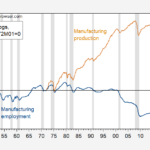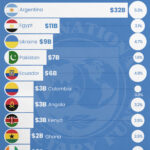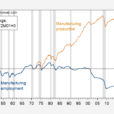
According to many mainstream economists, a lack of good correlation between the monetary growth and the growth rate of various price indexes casts doubt on the commonly held view that the key source of inflation is increases in money supply.
It is also argued that before the 1990, the relationship between money supply and inflation was positively correlated. However, from 1990 onward in the US and other major economies this correlation ceased to exist.
Some commentators have concluded that while in the past the increase in money supply had an effect on inflation this is not the case at present.
We suggest that the lack of correlation between the growth rate of money supply and the inflation rate does not prove that money has nothing to do with inflation. The main issue here is not about the strength of the statistical correlation but about the definition of what inflation is all about.
Observe that by popular view inflation is defined as increases in the prices of goods and services, which is depicted by the growth rate of various price indexes such as the consumer price index (CPI).
Some economists such as Ludwig von Mises and Murray Rothbard, following in the footsteps of classical economists, regard inflation as increases in money supply. So how are we to decide about the correct definition of inflation? Is it about increases in the money supply or increases in prices?
The Essence of Inflation
The purpose of a definition is to present the essence, the distinguishing characteristic of the subject we are trying to identify. A definition is to tell us what the fundamentals of a particular entity are. To define a thing we need to go to the origin of how it has emerged.
For Mises and Rothbard the subject matter of inflation is not just increases in the prices of goods and services but an act of embezzlement.
Historically, inflation originated when a country’s ruler such as the king would force his citizens to give him all their gold coins under the pretext that a new gold coin was going to replace the old one. In the process the king would falsify the content of the gold coins by mixing it with some other metal and return diluted gold coins to the citizens. On this Rothbard wrote,
















